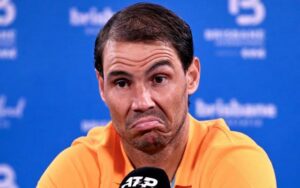Following recent matches, Nadal has been accused of bending the rules to gain an unfair advantage, igniting a firestorm of debate among fans and analysts alike.
In a defiant statement, Nadal has firmly denied any wrongdoing, asserting, “I didn’t do anything against the rules.”
The accusations stem from his recent performance at a high-stakes tournament, where opponents and commentators alleged that Nadal’s on-court behavior bordered on unsportsmanlike conduct. Critics pointed to his strategic timeouts and seemingly tactical interruptions during crucial moments as evidence of gamesmanship. These tactics, they argue, are designed to disrupt opponents’ rhythm and tilt the match in his favor.

Nadal’s response to these claims has been unequivocal. He insists that all his actions are within the regulations of the sport and part of his legitimate competitive strategy. “I’ve always played by the rules and respect the spirit of the game,” Nadal asserted. “Any suggestion otherwise is simply unfounded.”
The controversy has reignited the debate over what constitutes fair play in professional sports. Tennis, a game steeped in tradition and precision, often finds itself grappling with the fine line between strategic maneuvering and unethical behavior. As Nadal’s denial continues to make headlines, the tennis community remains divided, with some defending his right to utilize all available strategies, while others call for stricter enforcement of rules to preserve the sport’s integrity.
As the debate unfolds, Nadal’s reputation hangs in the balance, and the tennis world watches with bated breath for further developments.